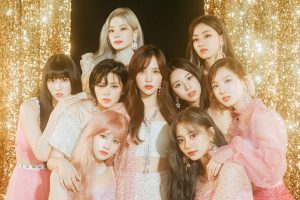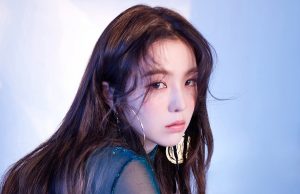
“Age ain’t nothing but a number,” American singer Aaliyah sang on her debut album in 1994, complaining about the discrimination she faced due to her young age. In the world of Korean entertainment, young age is the exact opposite — viewed as something of a virtue, a sticker that accompanies idols all the time. Simply said, the K-pop scene operates on the motto “the younger, the better”. This is an outcome of the rigid training system, in which idols are scouted, trained and, eventually debuted at very young ages. Only a few years ago, a 14-year-old member was considered an exception; now rookies born in 2007 and 2008 debuting have become the norm. The younger an idol, the longer they can promote and generate profit.
Ageism and a strong age bias have existed in K-pop for years, but these issues have recently come to attention after expressing themselves in different ways, both positive and negative. Last year, tvN aired Mama the Idol, a reality show that brought back former female idols in their late thirties and early forties, who have become mothers and wives. Over the run of the show, they juggled idol life and motherhood simultaneously, eventually returning to the stage as a group.
Two months ago, SM Entertainment faced backlash after announcing the debut of three new NCT members, among whom was Shohei, born in 1996. Online hate spread quickly, with many fans and netizens considering him too old to debut, even going as far as calling him a grandpa. Recently, rookie girl group Le Sserafim‘s oldest member Sakura voiced her concerns about re-debuting at her age (24) in the documentary “The World is My Oyster“, which chronicles the group’s path to debut. A debut at 24 is considered already too late in K-pop, regardless of the fact that Sakura has a decade-long career in her home country Japan in addition to her promotions as a member of Iz*One under her belt.

There have also been more disturbing incidents. Young idols often face severe sexualization and objectification, whether it’s in the form of overly revealing outfits or lyrics. Companies have their fair share of contribution to this, as such tactics bring in profit. Recently, rookie group NewJeans‘s label Ador faced backlash over the lyrics of “Cookie“, which blatantly made use of sexual innuendos, a choice that is hardly acceptable as the members are all minors. In light of this, the participation of much older male fans, presumably in their thirties or forties, in one of NewJeans’ fansign events becomes even more inappropriate.
All these have raised the question of an age restriction for when idols can legally debut, with many suggesting 18 as an appropriate number. Not only would this help to avoid exploitation or sexualization, but it would also facilitate longer careers for idols, especially female idols.
In which forms does age bias show itself in K-pop? First, it has to be pointed out that generally, much attention is given to age in South Korea. Age is considered crucial in Korean society, as the age hierarchy influences social interactions and expectations of behaviour. People of older age or higher standing have to be addressed accordingly with the right designation and level of formality in speech, and one can easily be regarded as disrespectful otherwise. In K-pop groups, aside from roles such as the leader, vocalist, dancer, and rapper, there is also a position that is assigned to the youngest member — the maknae. They are sometimes treated as the child of the group and expected to act in an adorable and endearing way, and at other times, they may be expected to complete chores that the older members are otherwise excused from.

In the unending cycle of K-pop, a group’s peak lasts roughly three to four years before other groups rise to the top. Once idol groups achieve a breakthrough, they are able to maintain their popularity by operating on a clear formula that consists of similar releases and concepts. For younger groups, these are predominantly colorful and cute. When the group starts growing older in the eye of the public, they are replaced by younger groups, who are easier to commercialize and play well into the parasocial relationship—non-reciprocal relationships involving a strong emotional bond with people who do not relate back to you–between fans and idols.
A prime example of this phenomenon is girl group Twice, who undoubtedly reigned the K-pop scene from 2016 to 2019 with catchy bubblegum pop. Relying on their charms, the ladies commanded the stage and achieved tremendous success. However, beginning with 2019’s “Feel Special“, the lack of chart success Twice achieved, compared to their previous all-kill hits, caused some to regard them as past their prime. As they gradually move towards more mature concepts and music, new groups with similar concepts emerged and replaced the space they left behind.
This lays bare one major trait of the ageism in K-pop — it clearly pertains much more to female than male idols. The abovementioned phenomenon is hard to observe when it comes to male groups, who are generally able to maintain their core popularity for many years despite military enlistment hiatuses. This allows male idols to promote well into their thirties with many groups engaging in group activities once in a while.

For female idols, on the other hand, 30 is regarded as a crucial and fairly old age. Until reaching this age, female idols are expected to have set their career perspectives. Many opt to give up their idol career and move into acting. Strikingly, when it comes to controversies, age is brought up way more often as a norm for female idols. When Red Velvet‘s Irene got into a Gapjil scandal in 2020, many attacked her by mentioning her age. However, a number of female idols have successfully defied this age bias by maintaining their popularity steadily throughout their career. Some notable names are SNSD‘s Taeyeon, Lee Hyori, BoA, and Brave Girls.
The suggested minimum age limit would generally profit the K-pop industry as a whole. Not only would it take the pressure off young idols and help prevent objectification, sexualization, and health issues that come with extreme dieting and overworking, but the age until which idols regularly promote would also increase. In the last few years, K-pop has grown more global than ever, and in a time where social and gender issues are frequently debated, K-pop is already facing and will continue to face negative criticism if idols’ careers are this affected by age.
It should, however, be pointed out that much of the opinion on female idols is a product of the thinking that is dominant in Korean culture and society. South Korea notoriously has severe gender issues and it will take years, if not decades, for these views and stigmatization to change and translate to Korean entertainment. However, reversing the direction of influence by making a start with K-pop, which is exposed to more international attention, might be a great beginning.
(AtlasObscura, KBiZoom, The Korea Times, KPopStarz. Images via SM Entertainment, JYP Entertainment, Source Music, YouTube)


